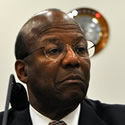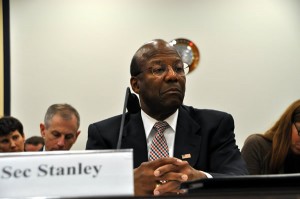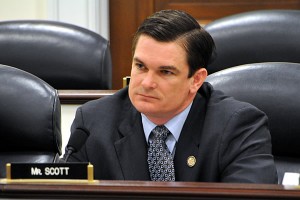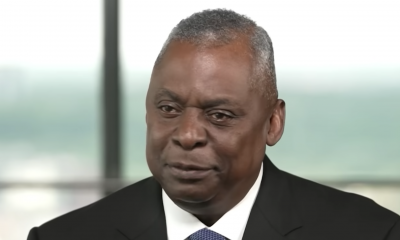National
‘Don’t Ask’ repeal could be certified mid-summer
Pentagon officials testify on ending military’s gay ban

Top Pentagon officials said Friday that “Don’t Ask, Don’t Tell” repeal training could sufficiently be complete by mid-summer to allow for certification to end to the law at that time during a congressional hearing in which GOP lawmakers expressed discontent with moving toward open service.
In a hearing before the House Armed Services personnel subcommittee, Undersecretary of Defense for Personnel & Readiness Clifford Stanley and Director of the Joint Staff Vice Adm. William Gourtney said implementation for “Don’t Ask, Don’t Tell” repeal is proceeding on track and troops are being trained to handle open service.
Stanley told the Republican-controlled panel that training could be sufficiently finished by mid-summer to allow for certification for repeal.
“We’re looking at mid-summer” to move towards certification, Stanley said, adding that this target time could be delayed if something disruptive emerges that Pentagon leaders don’t anticipate.
According to Stanley, the U.S. military has trained more than 200,000 members of the armed forces on handling open service, or about nine percent of the armed forces.
Gourtney concurred that mid-summer is the time for when certification for repeal is expected to happen.
“It’s really the magnitude of the challenge that’s out there and making sure that as we get our arms around the magnitude of the challenge, we don’t miss anything,” Gourtney said. “So we’re grateful for the deliberate process that has been laid out and we’re [looking at] mid-summer for the recommendation. Followed by 60 days after that, repeal is achievable.”
In December, President Obama signed legislation allowing for repeal of “Don’t Ask, Don’t Tell,” but the anti-gay law will only be off the books after 60 days pass following certification from the president, the defense secretary, and the chair of the Joint Chiefs of Staff. Gay service members are still in danger of discharge from the armed services until the certification process is complete.
The military services are progressing with three tiers of training to prepare troops for “Don’t Ask, Don’t Tell.” The Pentagon previously established in its repeal implementation plan that the completion of Tier 2 training — or the training of leadership of troops within a service — could be the time when certification could happen.
According to Stanley’s written testimony before the committee, Tier 2 training for the Navy is set to end on April 30, for the Air Force on May 1 and for the Coast Guard on May 15. For the Army, Tier 2 training is set for completion for its active component on July 15 and its reserve component on August 15. The Tier 2 training for the Marine Corps was already set for completion on March 15.
Goutney said the time for issuing repeal certification is dependent on when the Army completes its training for “Don’t Ask, Don’t Tell.” The admiral said instruction for the Army is expected to be complete at a later time because the service is larger than others.
Following the hearing, Aubrey Sarvis, executive director of the Servicemembers Legal Defense Network, told the Washington Blade he believed training for “Don’t Ask, Don’t Tell” could be accelerated and should be concluded by May 1.
“There’s no reason why it should take the better part of this year to get to open service,” Sarvis said. “So, if we don’t have certification until mid-July or August, then we’re talking about October or November before we get there. I don’t think that’s what the majority of members of voted for repeal had in mind.”
The subcommittee testimony from Stanley and Gourtney was expected to precede a hearing the full House Armed Services Committee on April 7. Josh Holly, a committee spokesperson, told the Blade each of the military service chiefs are slated to testify on “Don’t Ask, Don’t Tell” repeal on that date.
As Stanley and Gourtney provided an update on “Don’t Ask, Don’t Tell” repeal implementation efforts, they fielded questions from Republican subcommittee members who were hostile to moving torward open service.
Rep. Joe Wilson (R-S.C.), chair of the subcommittee, expressed displeasure with the pace at which the Democratic-controlled Congress last year moved forward with repeal legislation during the lame duck session of Congress.
“I felt the repeal was rushed through without adequate review and consideration of the extent of the full implications of repeal,” Wilson said. “I believe the lame duck session was undemocratic and that dozens of defeated congress members adopted a law with significant consequences, but it failed to even pass a budget. It was a violation of the principles of representative democracy.”
In response, Sarvis blasted Wilson for suggesting that Congress improperly moved forward with “Don’t Ask, Don’t Tell” repeal last year.
“Mr. Wilson knows better,” Sarvis said. “There was nothing undemocratic about last year’s vote to repeal ‘Don’t Ask, Don’t Tell.’ The measure passed both houses of Congress on a strong bi-partisan vote.”
Rep. Mike Coffman (R-Colo.), a veteran of the Army and Marine Corps, was particularly critical of the Pentagon report favoring open service that came out before Congress repealed the law and said he had “no confidence in the process” for implementing open service.
“I think that this survey and study was a conclusion looking for a study,” he said. “This is a political decision made by the executive branch and the military will follow it under whatever circumstances or ramifications it has to the combat effectiveness of our forces.”
Some of the more pointed criticism of “Don’t Ask, Don’t Tell” came from freshmen GOP lawmakers who were elected to office in 2010 during the Republican wave and weren’t present for the vote last year on ending the military’s gay ban.
Rep. Allen West (R-Fla.), an Army veteran of the first Persian Gulf War, said allowing open gays to serve in the armed forces is, in effect, forming “the military to a behavior.”
“I remember going through the military, we took behaviors and we formed it to the military,” West said. “Using a term that they have over in the Middle East, I’m just very wary of the fact that this could be the camel getting his nose under the tent.”
West also invoked the 2009 Foot Hood shootings in which Nidal Hasan, a U.S. Army major serving as a psychiatrist, was charged with killing people 13 with a firearm and wounding 29 others. Hasan is an American-born Muslim of Palestinian descent, and questions have emerged over whether pressures over his religion prompted the incident.
“We had commanders up here at Walter Reed that saw some very disturbing behaviors there with Maj. Nidal Hasan, but for whatever reasons — I think one of the main reasons is the retribution of an atmosphere of political correctness — they did not speak out about that,” West said. “Of course, we know what happened when he was transferred down to Foot Hood, Texas.”
R. Clarke Cooper, executive director of the Log Cabin Republicans, said he’s offended West would suggest “political correctness would trump military order and discipline” in addition to the lawmaker’s comparison of the service of gay troops to the Fort Hood assault.
“Congressman West’s remarks were an unnecessary and unfortunate distraction from the valuable report by the repeal implementation team,” Cooper said.
Questioning backfired on one freshman Republican who apparently was attempting to demonstrate that gay troops have been discharged not for identifying as gay, but for violating the military’s code of conduct.
Rep. Austin Scott (R-Ga.) asked Gourtney whether as a Navy officer he had discharged anyone from service because of sexual orientation. Gourtney admitted that he had in either 1994 to 1995.
“We had an incident shortly after ‘Don’t Ask, Don’t Tell’ passed that a young sailor came forward through his chaplain, through our chaplain, that he was gay, and we discharged him from the service,” Gourtney said.
When Scott pressed on whether this sailor was discharged because he was gay or because he violated a standard of conduct, Gourtney replied that it was because of the sailor’s gay identity and not for any other violation, much to the surprise of Scott.
“That’s not the answer I thought you would give,” Scott said, eliciting laughter from those who were in attendance at the hearing.
Gourtney added that there are cases in which standards of conduct have been violated as part of separations under “Don’t Ask, Don’t Tell,” but said these incidences are few in number.
Additionally, Scott asked about the cost of implementing “Don’t Ask, Don’t Tell.” Stanley replied the cost of training material has been about $10,000 — considerably a low number for government spending.
But Scott expressed skepticism about the estimate and requested further information.
“If something was done at the [Defense Department] for $10,000, I’d like to know what it was,” Scott said. “I haven’t seen anything out of there with a price-tag that low.”
Rep. Vicky Hartlzer (R-Mo.), another freshman Republican, noted that men and women aren’t permitted to bunk or shower to together in the armed forces and questioned why the military would ask straight troops to shower with gay service members.
In response, Gourtney said the rationale is based on the difference between gender and sexual orientation.
“Gender is very public and sexual preference is very private,” Gourtney said. “We’re not asking about their sexual preference.”
But Gourtney’s answer apparently didn’t allay Hartlzer, who said the military isn’t “being consistent” with its policy.
“I’m very concerned that in a time of war in our country — we have men and women in harm’s way — that we are making such a radical, major shift in our policy,” she said.
Hartlzer isn’t a stranger to taking anti-gay positions. Last month, she introduced a House resolution condemning President Obama for dropping defense of the Defense of Marriage Act against litigation in court.
Democrats who voted in favor of “Don’t Ask, Don’t Tell” repeal defended the decision of Congress to end the statute last year and said the focus of the 112th Congress should be moving toward that goal.
Rep. Susan Davis (D-Calif.), ranking Democrat on the subcommittee, said discussion should move away from whether open service should be implemented and Congress should instead focus on proper oversight of “Don’t Ask, Don’t Tell” repeal.
“I think the debate is no longer really on whether or not to allow gay, lesbian and bisexual American from serving in uniform,” Davis said. “The issue that we are here to focus on today is how the services and the department are preparing — and informing leadership — on how the policies and regulations that are being considered have an impact on military readiness, military effectiveness, unit cohesion and recruiting and retention of the armed forces.”
Rep. Chellie Pingree (D-Maine) said “Don’t Ask, Don’t Tell” repeal was a change that Congress needed last year to enact because the anti-gay law is “morally reprehensible policy.”
“I just think that it violated the fundamental value of fairness and equal treatment that we cherish in this country, and I’m just so pleased that we’re here to talk about the end to it and the transition out of it, which, I think, is great,” she said.
Following Scott’s question on the cost of implementing repeal, Pingree said the $10,000 number is infinitesimal compared to the $193.3 million estimate offered by the Government Accountability Office in January on the cost of “Don’t Ask, Don’t Tell” from fiscal years 2004 to 2009.
“It’s not only unconscionable that these people were willing to serve their country and came forward, or were asked to leave, but the costs are horrendous,” she said.
Despite the qualms of Republican subcommittee members, LGBT advocates dismissed the possibility that Congress could at this point delay or derail the end to the military’s gay ban. Rep. Duncan Hunter (R-Calif.) has introduced legislation that would expand the certification requirement to include input from each of the service chiefs, which, if enacted into law, could disrupt the repeal process.
Davis told the Blade she doesn’t think Congress has a chance of interfering with “Don’t Ask, Don’t Tell” now that legislation has already passed a measure that would repeal the statute.
“I think there are people that would love to slow down the process, but actually I think it’s proceeding fairly well and I don’t know that that would be necessary,” she said.
Sarvis said the ability of the opponents of “Don’t Ask, Don’t Tell” repeal in Congress to thwart open service at this time is “highly unlikely.”
“Obviously, there are a few members who would like to delay or derail, but I don’t think that’s where a majority are,” Sarvis said.
Federal Government
HHS to retire 988 crisis lifeline for LGBTQ youth
Trevor Project warns the move will ‘put their lives at risk’

The U.S. Department of Health and Human Services is planning to retire the national 988 crisis lifeline for LGBTQ youth on Oct. 1, according to a preliminary budget document obtained by the Washington Post.
Introduced during the Biden-Harris administration in 2022, the hotline connects callers with counselors who are trained to work with this population, who are four times likelier to attempt suicide than their cisgender or heterosexual counterparts.
“Suicide prevention is about risk, not identity,” said Jaymes Black, CEO of the Trevor Project, which provides emergency crisis support for LGBTQ youth and has contracted with HHS to take calls routed through 988.
“Ending the 988 Suicide and Crisis Lifeline’s LGBTQ+ youth specialized services will not just strip away access from millions of LGBTQ+ kids and teens — it will put their lives at risk,” they said in a statement. “These programs were implemented to address a proven, unprecedented, and ongoing mental health crisis among our nation’s young people with strong bipartisan support in Congress and signed into law by President Trump himself.”
“I want to be clear to all LGBTQ+ young people: This news, while upsetting, is not final,” Black said. “And regardless of federal funding shifts, the Trevor Project remains available 24/7 for anyone who needs us, just as we always have.”
The service for LGBTQ youth has received 1.3 million calls, texts, or chats since its debut, with an average of 2,100 contacts per day in February.
“I worry deeply that we will see more LGBTQ young people reach a crisis state and not have anyone there to help them through that,” said Janson Wu, director of advocacy and government affairs at the Trevor Project. “I worry that LGBTQ young people will reach out to 988 and not receive a compassionate and welcoming voice on the other end — and that will only deepen their crisis.”
Under Trump’s HHS secretary, Robert F. Kennedy, Jr., the agency’s departments and divisions have experienced drastic cuts, with a planned reduction in force of 20,000 full-time employees. The Substance Abuse and Mental Health Services Administration has been sunset and mental health services consolidated into the newly formed Administration for a Healthy America.
The budget document reveals, per Mother Jones, “further sweeping cuts to HHS, including a 40 percent budget cut to the National Institutes of Health; elimination of funding for Head Start, the early childhood education program for low-income families; and a 44 percent funding cut to the Centers for Disease Control, including all the agency’s chronic disease programs.”
U.S. Supreme Court
Supreme Court hears oral arguments in LGBTQ education case
Mahmoud v. Taylor plaintiffs argue for right to opt-out of LGBTQ inclusive lessons

The U.S. Supreme Court on Tuesday heard oral arguments in Mahmoud v. Taylor, a case about whether Montgomery County, Md., public schools violated the First Amendment rights of parents by not providing them an opportunity to opt their children out of reading storybooks that were part of an LGBTQ-inclusive literacy curriculum.
The school district voted in early 2022 to allow books featuring LGBTQ characters in elementary school language arts classes. When the county announced that parents would not be able to excuse their kids from these lessons, they sued on the grounds that their freedom to exercise the teachings of their Muslim, Jewish, and Christian faiths had been infringed.
The lower federal courts declined to compel the district to temporarily provide advance notice and an opportunity to opt-out of the LGBTQ inclusive curricula, and the 4th U.S. Circuit Court of Appeals determined that the parents had not shown that exposure to the storybooks compelled them to violate their religion.
“LGBTQ+ stories matter,” Human Rights Campaign President Kelley Robinson said in a statement Tuesday. “They matter so students can see themselves and their families in the books they read — so they can know they’re not alone. And they matter for all students who need to learn about the world around them and understand that while we may all be different, we all deserve to be valued and loved.”
She added, “All students lose when we limit what they can learn, what they can read, and what their teachers can say. The Supreme Court should reject this attempt to silence our educators and ban our stories.”
GLAD Law, NCLR, Family Equality, and COLAGE submitted a 40-page amicus brief on April 9, which argued the storybooks “fit squarely” within the district’s language arts curriculum, the petitioners challenging the materials incorrectly characterized them as “specialized curriculum,” and that their request for a “mandated notice-and-opt-out requirement” threatens “to sweep far more broadly.”
Lambda Legal, the Leadership Conference on Civil and Human Rights, PFLAG, and the National Women’s Law Center announced their submission of a 31-page amicus brief in a press release on April 11.
“All students benefit from a school climate that promotes acceptance and respect,” said Karen Loewy, senior counsel and director of constitutional law practice at Lambda Legal. “Ensuring that students can see themselves in the curriculum and learn about students who are different is critical for creating a positive school environment. This is particularly crucial for LGBTQ+ students and students with LGBTQ+ family members who already face unique challenges.”
The organizations’ brief cited extensive social science research pointing to the benefits of LGBTQ-inclusive instruction like “age-appropriate storybooks featuring diverse families and identities” benefits all students regardless of their identities.
Also weighing in with amici briefs on behalf of Montgomery County Public Schools were the National Education Association, the ACLU, and the American Psychological Association.
Those writing in support of the parents challenging the district’s policy included the Center for American Liberty, the Manhattan Institute, Parents Defending Education, the Alliance Defending Freedom, the Trump-Vance administration’s U.S. Department of Justice, and a coalition of Republican members of Congress.
U.S. Supreme Court
LGBTQ groups: SCOTUS case threatens coverage of preventative services beyond PrEP
Kennedy v. Braidwood oral arguments heard Monday

Following Monday’s oral arguments before the U.S. Supreme Court in Kennedy v. Braidwood Management, Inc., LGBTQ groups issued statements warning the case could imperil coverage for a broad swath of preventative services and medications beyond PrEP, which is used to reduce the risk of transmitting HIV through sex.
Plaintiffs brought the case to challenge a requirement that insurers and group health plans cover the drug regimen, arguing that the mandate “encourage[s] homosexual behavior, intravenous drug use, and sexual activity outside of marriage between one man and one woman.”
The case has been broadened, however, such that cancer screenings, heart disease medications, medications for infants, and several other preventive care services are in jeopardy, according to a press release that GLAAD, Lambda Legal, PrEP4All, Harvard Law’s Center for Health Law and Policy Innovation (CHLPI), and the Center for HIV Law and Policy (CHLP) released on Monday.
The Trump-Vance administration has argued the independent task force responsible for recommending which preventative services must be covered with no cost-sharing for patients is constitutional because the secretary of the U.S. Department of Health and Human Services can exercise veto power and fire members of the volunteer panel of national experts in disease prevention and evidence-based medicine.
While HHS secretaries have not exercised these powers since the Affordable Care Act was passed in 2010, Braidwood could mean Trump’s health secretary, Robert F. Kennedy Jr., takes a leading role in determining which services are included in the coverage mandate.
Roll Call notes the Supreme Court case comes as the administration has suspended grants to organizations that provide care for and research HIV while the ongoing restructuring of HHS has raised questions about whether the “Ending the HIV Epidemic” begun under Trump’s first term will be continued.
“Today’s Supreme Court hearing in the Braidwood case is a pivotal moment for the health and rights of all Americans,” said GLAAD President Sarah Kate Ellis. “This case, rooted in discriminatory objections to medical necessities like PrEP, can undermine efforts to end the HIV epidemic and also jeopardize access to essential services like cancer screenings and heart disease medications, disproportionately affecting LGBTQ people and communities of color.”
She added, “Religious exemptions should not be weaponized to erode healthcare protections and restrict medically necessary, life-saving preventative healthcare for every American.”
Lambda Legal HIV Project Director Jose Abrigo said, “The Braidwood case is about whether science or politics will guide our nation’s public health policy. Allowing ideological or religious objections to override scientific consensus would set a dangerous precedent. Although this case began with an attack on PrEP coverage, a critical HIV prevention tool, it would be a serious mistake to think this only affects LGBTQ people.”
“The real target is one of the pillars of the Affordable Care Act: The preventive services protections,” Abrigo said. “That includes cancer screenings, heart disease prevention, diabetes testing, and more. If the plaintiffs succeed, the consequences will be felt across every community in this country, by anyone who relies on preventive care to stay healthy.”
He continued, “What’s at stake is whether we will uphold the promise of affordable and accessible health care for all or allow a small group of ideologues to dismantle it for everyone. We as a country are only as healthy as our neighbors and an attack on one group’s rights is an attack on all.”
PrEP4All Executive Director Jeremiah Johnson said, “We are hopeful that the justices will maintain ACA protections for PrEP and other preventive services, however, advocates are poised to fight for access no matter the outcome.”
He continued, “Implementing cost-sharing would have an enormous impact on all Americans, including LGBTQ+ individuals. Over 150 million people could suddenly find themselves having to dig deep into already strained household budgets to pay for care that they had previously received for free. Even small amounts of cost sharing lead to drops in access to preventive services.”
“For PrEP, just a $10 increase in the cost of medication doubled PrEP abandonment rates in a 2024 modeling study,” Johnson said. “Loss of PrEP access would be devastating with so much recent progress in reining in new HIV infections in the U.S. This would also be a particularly disappointing time to lose comprehensive coverage for PrEP with a once every six month injectable version set to be approved this summer.”
“Today’s oral arguments in the Braidwood case underscore what is at stake for the health and well-being of millions of Americans,” said CHLPI Clinical Fellow Anu Dairkee. “This case is not just about legal technicalities — it is about whether people across the country will continue to have access to the preventive health services they need, without cost sharing, regardless of who they are or where they come from.”
She continued, “Since the Affordable Care Act’s preventive services provision took effect in 2010, Americans have benefited from a dramatic increase in the use of services that detect disease early, promote healthy living, and reduce long-term health costs. These benefits are rooted in the work of leading scientists and public health experts, including the U.S. Preventive Services Task Force, whose recommendations are based on rigorous, peer-reviewed evidence.”
“Any shift away from cost-free access to preventive care could have wide-ranging implications, potentially limiting access for those who are already navigating economic hardship and health disparities,” Dairkee said. “If Braidwood prevails, the consequences will be felt nationwide. We risk losing access to lifesaving screenings and preventive treatments that have become standard care over the past decade.”
“This case should serve as a wake-up call: Science, not politics, must guide our health care system,” she said. “The health of our nation depends on it.”
“We are grateful for the Justices who steadfastly centered constitutionality and didn’t allow a deadly political agenda to deter them from their job at hand,” said CHLP Staff Attorney Kae Greenberg. “While we won’t know the final decision until June, what we do know now is not having access to a full range of preventative healthcare is deadly for all of us, especially those who live at the intersections of racial, gender and economic injustice.”
“We are crystal clear how the efforts to undermine the ACA, of which this is a very clear attempt, fit part and parcel into an overall agenda to rollback so much of the ways our communities access dignity and justice,” he said. “Although the plaintiffs’ arguments today were cloaked in esoteric legal language, at it’s heart, this case revolves around the Christian Right’s objection to ‘supporting’ those who they do not agree with, and is simply going to result in people dying who would otherwise have lived long lives.”
“This is why CHLP is invested and continues in advocacy with our partners, many of whom are included here,” Greenberg said.
-

 Federal Government3 days ago
Federal Government3 days agoHHS to retire 988 crisis lifeline for LGBTQ youth
-

 Opinions3 days ago
Opinions3 days agoDavid Hogg’s arrogant, self-indulgent stunt
-

 District of Columbia3 days ago
District of Columbia3 days agoD.C. police seek help in identifying suspect in anti-gay threats case
-

 Virginia3 days ago
Virginia3 days agoGay talk show host wins GOP nom for Va. lieutenant guv














